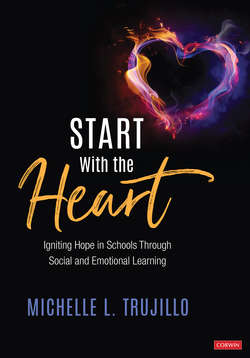Читать книгу Start With the Heart - Michelle L. Trujillo - Страница 19
На сайте Литреса книга снята с продажи.
Knowledge and Awareness Are Powerful Allies
ОглавлениеWe may be hesitant to admit that we, as human beings who have chosen a caring profession, might be inherently prejudiced or discriminatory, but we must take time to consider this possibility. I reflect on the wisdom that can be found in the cliché “You don’t know what you don’t know.” Probably the best guidance a mentor gave me during my first year as an administrator was to “talk less and listen more” as a direct response to this cliché. All professionals, regardless of their role in education, can benefit from this advice. Once in this “listening” state, we can set out to educate ourselves because there is much for us to learn. For example, many people are not aware that
black youth are two to three times more likely than white youth to be suspended. Similar disparities occur between male and female students; still, in many schools the suspension rate for black female students surpasses the rates for male students who aren’t black (Gregory & Fergus, 2017, p. 119).
There is a disproportionality for Latinx students, too, when compared to their non-Latinx white peers. According to Joy Pastan Greenberg (2012), “[Latinx] students have higher retention and suspension/expulsion rates, higher high school dropout rates, and lower completion of college rates that their white counterparts” (p. 75).
And, what about students who are eligible for special education, or those living in poverty—regardless of race, or students who identify as transgender? Studies have found disparities in these subpopulations, and others, as well. Do you think if more educators became aware of the data that expose such disproportionalities, they might be fairer when doling out classroom or administrative discipline? I do. Based on my observations in various school settings, explicit bias—that is, outright and conscious bias—is not prevalent. In fact, I firmly believe that the majority of teachers and administrators do not deliberately choose to show bias, or to be intentionally partial to one student over another, but statistics prove that such bias and partiality happen commonly and consistently (Skiba et al., 2011).
Knowledge and awareness are powerful allies in creating school environments that are inviting, positive, and engaging. Setting schoolwide norms of high expectations that provide opportunities for staff and students to teach each other about cultural and familial customs, to communicate views and needs assertively, and to listen respectfully can contribute to an empathetic school culture, one that promotes genuine acceptance, an appreciation for diversity, and an awareness of situations in which we revert to subconscious biases.
We must also be aware of situations in which we offend, or seem to offend, a student or colleague. Most of us have been in situations in which we felt that we may have offended another person. We may not even be sure of what we did or said to offend; but we can certainly feel the aloofness that appears out of nowhere or a new attitude that is discernably different and appears rude or demonstrates without words when we have offended someone. When we sense this, no harm can come from our expressing a sincere apology for anything we may have inadvertently said or done to insult or hurt another. More than once, I have found myself saying something like this to a student, parent, or guardian: “I have a feeling I may have offended you. Please know that this was not my intention. Is there anything you can tell me to help me to be more understanding in the future?” To put oneself on the line in such a way takes vulnerability, but this can be a leadership strength that facilitates a positive outcome. More often than not, the other person offers an explanation and any tension in the room dissipates so that we’re able to move forward with clarity and consideration.
